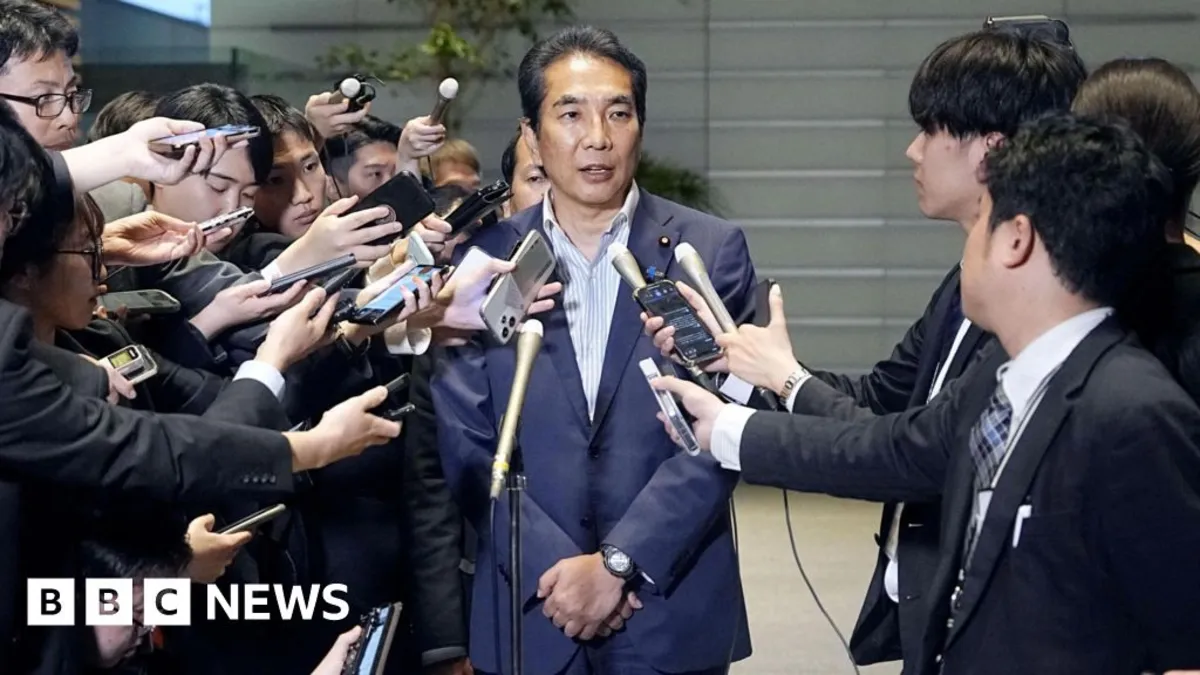
Just hours ago, Japan's farm minister, Taku Eto, made headlines after his controversial remarks about never needing to buy rice, as his supporters generously provide him with gifts of this staple food. What was intended to be a light-hearted comment turned into a significant backlash, leading to Eto's resignation. This incident is particularly noteworthy as Japan grapples with its first major cost-of-living crisis in decades, severely impacting the price of rice, a beloved staple in Japanese cuisine.
In the past year, the price of rice has more than doubled, causing widespread concern among consumers. The scarcity of imported rice has only exacerbated the situation. Following his comments, Eto issued an apology, acknowledging that his remarks were inappropriate. His resignation came swiftly after opposition parties threatened a no-confidence motion against him, further complicating matters for Prime Minister Shigeru Ishiba's minority government, which is already facing dwindling public support.
In Japan, rice is not just a food item; it holds significant cultural and political weight. Historical events, such as the 1918 rice riots that led to a government overthrow, illustrate how critical rice prices can be in the political arena. The current surge in rice prices is also linked to Prime Minister Ishiba's falling approval ratings, demonstrating the potential for economic issues to sway public opinion.
31-year-old Memori Higuchi, a first-time mother from Yokohama, shared her concerns about rising rice prices. With her seven-month-old daughter soon transitioning to solid foods, Higuchi emphasized the importance of quality nutrition for her family. "If prices keep going up, we may have to reduce the amount of rice my husband and I eat," she remarked, highlighting the personal implications of this economic crisis.
According to agricultural economist Kunio Nishikawa from Ibaraki University, the current rice shortage is a straightforward issue of supply and demand. However, he believes it stems from governmental miscalculations. Historically, the Japanese government closely regulated rice production until 1995, when control was lifted. Despite ongoing efforts to publish demand estimates, the government's 2023 and 2024 figures were inaccurate, predicting a demand of 6.8 million tonnes when the actual demand was 7.05 million tonnes.
The rise in rice demand can be attributed to a surge in tourism and a shift toward dining out post-pandemic. However, production fell short of estimates, reaching only 6.61 million tonnes. The quality of rice has also been impacted by extreme temperatures, further complicating the supply chain.
Rice farmers have faced financial hardships for years. Kosuke Kasahara, a 59-year-old farmer from Niigata, explained that the cost of producing 60 kilograms of rice is approximately 18,500 yen ($125.70), while local cooperatives offered to buy it for just 19,000 yen. In recent years, the government has even incentivized municipalities to reduce rice production, leading to a decline in profitability for farmers.
Despite soaring prices, the government auctioned some of its emergency rice reserves in March to stabilize the market. Historically, Japan's rice stockpiles have only been accessed after natural disasters, making this intervention unprecedented. Farmers like Shinya Tabuchi expressed feelings of betrayal as the government had previously indicated that it would not release emergency stocks to control prices.
The rice crisis is not confined to Japan; Southeast Asia, which accounts for nearly 30% of global rice production, has also experienced economic and climate-induced shortages. In response to the crisis, Japan has begun importing rice from South Korea for the first time in 25 years, despite a strong preference for domestically grown varieties. Prime Minister Ishiba has suggested expanding rice imports from the U.S. as negotiations for a trade deal continue.
Consumers like Higuchi are hesitant to purchase non-Japanese rice, emphasizing the importance of local production. "There has to be a way for Japanese farmers to be profitable while ensuring consumers can afford home-grown produce," she stated. This sentiment reflects a broader concern about the sustainability of Japan's agricultural industry.
The debate among farmers is ongoing. While some argue that the aging farming population can afford to sell rice cheaply due to pensions, others stress the need for younger farmers to achieve profitability. Kasahara advocates for a guaranteed buying price of 32,000 to 36,000 yen per 60 kilograms of rice to ensure sustainability, even if it is lower than current market prices.
As Japan prepares for a critical national election this summer, the government faces the challenge of balancing the interests of both consumers and farmers. The situation remains delicate, particularly in light of the recent political fallout from Eto's resignation. Addressing the ongoing rice crisis will be crucial for maintaining public trust and support in the coming months.